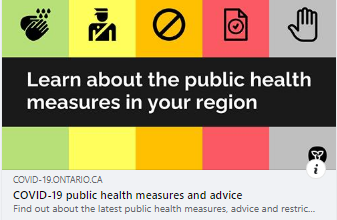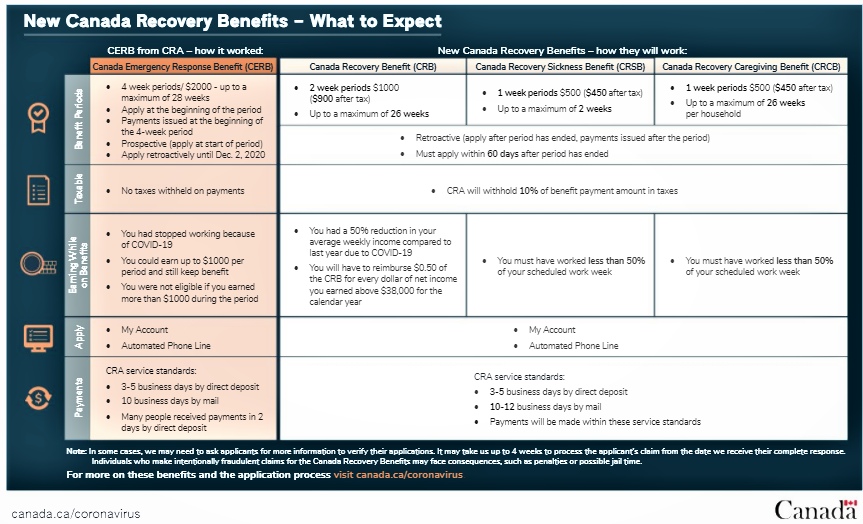 Ontario Emergency Brake restrictions are posted on this website. https://covid-19.ontario.ca/zones-and-restrictions https://covid-19.ontario.ca/zones-and-restrictions Provincewide shutdown As COVID-19covid 19 cases continue to rise at an alarming rate, a provincewide shutdown is in effect as of Saturday, April 3, at 12:01 a.m. This will help:
What this means Starting April 3, the COVID-19covid 19 Response Framework (colour-coded zones) is paused. We must all follow temporary restrictions and public health and workplace safety measures. The impacts of these measures will be evaluated after one month to determine if it is safe to lift the restrictions or if they need to be extended. You should:
0 Comments
Enter some information below to find out how you can schedule your vaccine appointments. You can also do this for someone else, if you manage their medical care and appointments. https://covid-19.ontario.ca/book-vaccine/?fbclid=IwAR1lsILYbnSOaG4vnx8iZJAeAWzixNWNtYxElExJbJYvpwQnaKmFTyVxyL4 You might be able to book COVID-19 vaccine appointments through the City of Toronto Health Unit general phone lineYou can also contact your employer, care home, or community group to find out if they have their own vaccination plans (if applicable). If you are 18 years old or older and identify as First Nations, Inuit or Métis, contact your local First Nations, Inuit and Métis health organization supporting local vaccination clinics. Your public health unit general phone line: 1-888-385-1910 Additional resources Visit City of Toronto Health Unit for more information. Residents who are eligible can book an appointment at immunization clinics in Toronto using the Province’s vaccination registration system (note browser requirements) or by calling the Provincial Vaccine Information Line at 1-888-999-6488 (TTY 1-866-797-0007). Find a clinic location. Book a Vaccine Toronto is in the Grey-Lockdown Zone . Residents aged 70+ or born in 1951 or earlier can book appointments at City’s mass immunization clinics. Eligible residents can also be vaccinated at hospital immunization clinics or pharmacies . As of February 21, 2021 at 11:59 pm ET, you must meet the new testing and quarantine requirements when coming to Canada. Use the checklist that applies to you: Flying to Canada requirements checklist Alternative: Driving to Canada checklist During the COVID-19 pandemic, we strongly advise Canadians to cancel or postpone non-essential travel plans outside of Canada. Now is not the time to travel. People who travel by air, regardless of citizenship, will need to follow testing and quarantine requirements to keep Canadians safe, particularly given the new COVID-19 variants in Canada and around the world. International travellers flying through Canada may not need to follow this checklist. See transit to another country by air. Please visit : https://travel.gc.ca/travel-covid/travel-restrictions/flying-canada-checklist Driving to Canada requirements checklist Alternative: Flying to Canada checklist During the COVID-19 pandemic, we strongly advise Canadians to cancel or postpone non-essential travel plans outside of Canada. Now is not the time to travel. People who travel, regardless of citizenship, will need to follow testing and quarantine requirements to keep Canadians safe, particularly given the new COVID-19 variants in Canada and around the world. Please visit : https://travel.gc.ca/travel-covid/travel-restrictions/driving-canada-checklist Official Global Travel Advisories
Mandatory COVID-19 testingTo be allowed to board a flight to Canada, all air passengers 5 years of age or older, including Canadians, are required to show a negative COVID-19 molecular test result taken within 72 hours of their scheduled time of departure to Canada. If the traveller has a connecting flight to Canada, the pre-departure test must be conducted within 72 hours of the last direct flight to Canada. This means they may need to schedule a COVID-19 test at their transit city within 72 hours of their direct flight to Canada. All travellers 5 years of age or older, including Canadians, arriving to Canada by land are required to show a negative COVID-19 molecular test result taken in the United States within 72 hours prior to crossing the border into Canada. Alternatively, travellers can present a positive COVID-19 molecular test taken between 14 and 90 days prior to departure. More information on measures in place to enter Canada – Government of Canada please visit : https://travel.gc.ca/travelling/advisories Updates on Immigration Matters Impacted by COVID-19 Travel from the US (OIC 16): Prohibits all “non-discretionary travel” from the United States. Does not exclude entry for those including:
BIOMETRICS RESTRICTIONS
JOB CHANGES
DELAYED PROCESSING
Canada Recovery Benefit (CRB)The Canada Recovery Benefit (CRB) gives income support to employed and self-employed individuals who are directly affected by COVID-19 and are not entitled to Employment Insurance (EI) benefits. The CRB is administered by the Canada Revenue Agency (CRA).
If you are eligible for the CRB, you can receive $1,000 ($900 after taxes withheld) for a 2-week period. If your situation continues past 2 weeks, you will need to apply again. You may apply up to a total of 13 eligibility periods (26 weeks) between September 27, 2020 and September 25, 2021. Canada Recovery Caregiving Benefit (CRCB)The Canada Recovery Caregiving Benefit (CRCB) gives income support to employed and self-employed individuals who are unable to work because they must care for their child under 12 years old or a family member who needs supervised care. This applies if their school, regular program or facility is closed or unavailable to them due to COVID-19, or because they are sick, self-isolating, or at risk of serious health complications due to COVID-19. The CRCB is administered by the Canada Revenue Agency (CRA).
If you are eligible for the CRCB, your household can receive $500 ($450 after taxes withheld) for each 1-week period. If your situation continues past 1 week, you will need to apply again. You may apply up to a total of 26 weeks between September 27, 2020 and September 25, 2021. Canada Recovery Sickness Benefit (CRSB)The Canada Recovery Sickness Benefit (CRSB) gives income support to employed and self-employed individuals who are unable to work because they are sick or need to self-isolate due to COVID-19, or have an underlying health condition that puts them at greater risk of getting COVID-19. The CRSB is administered by the Canada Revenue Agency (CRA).
If you are eligible for the CRSB, you can receive $500 ($450 after taxes withheld) for a 1-week period. If your situation continues past 1 week, you will need to apply again. You may apply up to a total of 2 weeks between September 27, 2020 and September 25, 2021. COVID-19 Updates: Travel RestrictionsTravel from the US (OIC 16): Prohibits all “non-discretionary travel” from the United States. Does not exclude entry for those including:
COVID-19 Updates: Biometrics Exemptions Biometrics collections centres in Canada remain closed without further notice. This has caused processing delays with PR and TR applications. Applicants in Canada recently exempted from biometrics for certain types of applications – but NOT PR applications. If you have already applied and paid for biometrics, you will get a refund at the end of processing; if you haven’t yet applied, there is no need to pay the fee. If you are in process for PR, complete of PR processing cannot occur without biometrics (even if you have valid biometrics from a recent TR application). That said, your application will not be refused because you missed a biometrics deadline. COVID-19 Updates: Job ChangesIn May 2020, IRCC introduced a policy that allows workers to change employers even without/before they have obtained a new LMIA approval or PNP nomination. Details are found here: Applicants applying under this policy make clear that they are seeking to engage the exemption, and will receive a letter from IRCC within ~10 days allowing them to switch employers while their underlying LMIA, PNP or employer compliance approval is pending. That underlying approval is then forwarded to the department before the work permit itself is issued. COVID-19 Updates: Delayed ProcessingCitizenship tests and ceremonies have been cancelled since March 2010 -some are being scheduled online, but in a very ad hoc way.
In person landings are no longer happening, though some are being landed by email. Again, this is happening in a very ad hoc way. Spousal applications and open work permits are processing much slower than usual. Hearings at all levels of the IRB and Federal court have been either cancelled or slower to schedule. LMIAs (except for essential workers and caregivers) have slowed to a crawl, or stopped processing entirely. Many visa office applications are extremely slow to process, and those in closed visa offices and visa application centres are not processing at all. Many people are still being impacted by COVID-19 and require temporary income support. To ensure that Canadians continue to have the help they need the Government of Canada has introduced three new benefits, delivered by the Canada Revenue Agency (CRA): the Canada Recovery Benefit (CRB), the Canada Recovery Sickness Benefit (CRSB), and the Canada Recovery Caregiving Benefit (CRCB). Today, the Honourable Diane Lebouthillier, Minister of National Revenue, opened the application process for the CRSB and the CRCB. Applications for the CRB will be accepted as of October 12, 2020. Quick facts
|
Categories |
Proudly powered by Weebly

